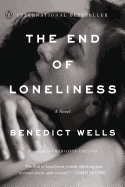
| Publisher: | Penguin Books | |
| Genre: | Family Life, Literary, Coming of Age, Fiction, Siblings | |
| ISBN: | 9780143134008 | |
| Pub Date: | January 2019 | |
| Price: | $16 |
| Starred | Fiction |
by Benedict Wells, trans. by Charlotte Collins
Not since Patrick Modiano's excellent The Black Notebook has a novel so deftly probed memory and longing, the losses of childhood and the pain of loving as Benedict Wells's The End of Loneliness, translated from the German by Charlotte Collins. Jules, the youngest of three siblings, struggles with isolation and loss after his parents are killed in a car accident and he is sent to boarding school. Of his parents, Jules says, "My father had moved [to France] when he finished school because he wanted to escape his family. My mother had moved there because she loved France. (And because she wanted to escape her family)." But he could be saying the same for himself and his siblings. They will spend the next few decades attempting to escape their family legacy and, at times, each other.
Jules's internal life and his complex relationship with Alva, a fellow boarding school student, are superbly crafted, as are his observations about his siblings, who have the same depth and individuality.
Additionally, there is a beguiling and tragic uncertainty: Jules is unable fully to reconstruct or reinterpret a childhood devoured by relentless time and is unable fully to know or understand distant Alva and his lost parents. His sister, who has struggled with both with her beauty and her restlessness, remarks, "Everything's over so quickly and you can't hold on to anything. All you can do is be." For Jules, neither life nor Alva can be pinned down; both can only be fleetingly experienced. --Evan M. Anderson, collection development librarian, Kirkendall Public Library, Ankeny, Iowa

| Publisher: | Putnam | |
| Genre: | Humorous, Family Life, General, Literary, Fiction | |
| ISBN: | 9780735214378 | |
| Pub Date: | January 2019 | |
| Price: | $26 |
| Fiction |
by John Kenney
Ted Grayson isn't mad at the world, just the young woman fussing with his hair before a broadcast, but he was already in a mood. After decades as America's anchorman, he's not social media-savvy and couldn't foresee the fallout of his tirade being caught on video, then reposted. John Kenney's Talk to Me opens with a despondent Ted literally mid-air, with no plan to open his parachute.
A few chapters later, readers learn Ted's fate: after the disappointment of no word from his hostile daughter, Franny, for his 59th birthday; after the we-need-to-talk-I've-met-someone message from his lovely wife, Claire; after the New York Post photo snapped when he'd forgotten to zip up--he survives the skydive. For the most part, Ted's life, revealed in chapters leading to "the incident," doesn't inspire sympathy, but Kenney's (Truth in Advertising) dark humor evokes understanding. And Ted's comeuppance as "the feminist pariah" (among other slurs) is so complete that one can't resist hoping for redemption.
Seduced by fame, Ted had neglected his family. It seems Claire's earned an attentive lover and the right to imagine a settlement confrontation like one from "a Hugh Grant movie... with an Elvis Costello soundtrack." Franny, working for an infotainment site called scheisse ("no rules, just clicks and shocks") has rejected everything about her father, including his surname.
Before his unraveling, Ted muses on the 2017 culture that contributes to his downfall: "Sarcasm had replaced hope. Cruelty and judgment had replaced empathy." Fittingly, a surprise twist reveals that hope and empathy can prevail. --Cheryl Krocker McKeon, manager, Book Passage, San Francisco
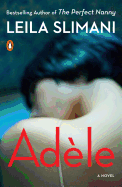
| Publisher: | Penguin Books | |
| Genre: | Women, Psychological, Literary, Fiction | |
| ISBN: | 9780143132189 | |
| Pub Date: | January 2019 | |
| Price: | $16 |
| Fiction |
by Leila Slimani, trans. by Sam Taylor
On the surface, Adèle has a perfect life. She is a successful journalist in Paris, living with her well-off husband and young son. She wants for nothing--except that she craves, constantly and without restraint, sex. Her pursuit of it--with strangers, with coworkers, with distant friends, with anyone who is willing and able--defines her days and nights, filling her life with a complicated web of lies and illicit affairs. Leila Slimani (The Perfect Nanny) paints a vivid and detailed picture of addiction and sexuality in Adèle, translated from the French by Sam Taylor. For though she is exhausted by her exploits, disgusted by them even, Adèle cannot imagine her life without them: "Her obsessions devour her. She is helpless to stop them."
There's more to it than sex, however, and more to it than passion or connection or other emotions commonly tied up in physical relationships. In the face of a life of monotony and repetition, caring for her children and caring for her husband and repeating the actions of every "bourgeois mother" that's come before her, her sexual exploits give her a secret to cradle close to herself, a way to define herself against the world. If she gives them up, she knows, she will never be able look at strangers' staring and tell herself, "Let them think whatever they want. They'll never know the truth."
In this, Adèle moves from an exploration of eroticism and addiction to an exploration of motherhood--indeed, womanhood--that is as insightful as it is graphic and shockingly universal despite its unusual premise. --Kerry McHugh, blogger at Entomology of a Bookworm
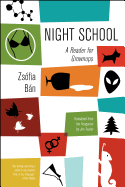
| Publisher: | Open Letter | |
| Genre: | Women, Short Stories (single author), Absurdist, Literary, Fiction | |
| ISBN: | 9781940953885 | |
| Pub Date: | January 2019 | |
| Price: | $15.95 |
| Fiction |
by Zsófia Bán, trans. by Jim Tucker
Night School is hard to pin down. The chapters in Hungarian author Zsófia Bán's book are short stories, philosophical excursions and meta-textual experiments. Called "A Reader for Grownups," the book, translated by Jim Tucker, is funny, daring and heartbreakingly tragic, as if Bán is trying to cram all aspects of human life into Night School's pages. It is immensely rewarding for anyone who is interested in diving into hard topics with a distinctive literary voice.
Each chapter is framed as a lesson, with subjects like "Geography/History." There are prompts such as "IF IT TAKES ONE SECOND for you to hit five targets without reloading and you don't get interrupted, then what time in the afternoon does the water change color?" Sometimes these subjects and prompts are merely absurd, but in other cases they provide a fitting context for the chapter and deeper understanding of the story or exegesis that Bán has cooked up.
The chapters themselves are a bit scattershot: one is a presentation about Gustave Flaubert; another a fairytale-like depiction of a rape and murder; and another a modern sequel to Les Liaisons dangereuses. But this diverse subject matter does not mean Bán has lost control. If anything, her ability to shift so quickly and confidently across the arc of human time and subject matter resembles a gymnast performing a virtuosic feat on the balance beam. Reading Night School has that same breathtaking quality as Bán pivots and twirls, covering everything she believes "A Reader for Grownups" should have. --Noah Cruickshank, adult engagement manager, the Field Museum, Chicago, Ill.
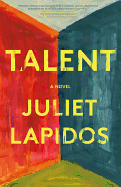
| Publisher: | Little, Brown | |
| Genre: | Humorous, General, Literary, Coming of Age, Fiction | |
| ISBN: | 9780316480550 | |
| Pub Date: | January 2019 | |
| Price: | $27 |
| Fiction |
by Juliet Lapidos
In Juliet Lapidos's debut novel, Talent, academic ambition meets cynical self-loathing as Anna Brisker languishes in the seventh year of her Ph.D. program at Collegiate University. Anxious about disappointing her pretentious parents and emotionally distant adviser, Anna is frantic not just to finish her dissertation but to pen a project that will win back the respect of her family, peers and teachers. After meeting Helen Langley, niece of the late, famously commercial author Frederick Langley, Anna discovers that Frederick has left behind a series of unpublished notebooks that could give her the material she needs. But the Langley family's sleazy secrets and Anna's own mounting desperation prove to be a malevolent combination.
Anna's biting, first-person narration leads the story convincingly from the start and captures the selfish desire, obsession and contempt that defines a larger critique of academia. More importantly, she's a strongly sympathetic protagonist--even as Anna makes one wrong decision after another, she remains more a tragic hero than a comedic villain. Lapidos also expertly captures the Ivy League atmosphere, puncturing its ballooning worth with rapid, insightful jabs. Between its baguette-ripping, self-congratulatory graduate students and its posturing, psychoanalytic professors, the world of New Harbor, Conn., is far more real than the theory of inspiration with which Anna is grappling. Meanwhile, with its quick pace and spiraling action, the mystery at the heart of the story serves as the driving external action to Anna's internal unraveling. A meta-criticism of criticism, Talent is most successful at striking an uncanny balance between laughing at the world that constructs characters like Anna and convincing the reader of its importance. --Alice Martin, freelance writer and editor
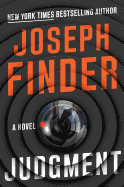
| Publisher: | Dutton | |
| Genre: | Crime, Suspense, Thrillers, Fiction | |
| ISBN: | 9781101985816 | |
| Pub Date: | January 2019 | |
| Price: | $28 |
| Mystery & Thriller |
by Joseph Finder
Joseph Finder's (Guilty Minds) expert thrillers are like bullet trains; they immediately shoot out of the gate and provide breathtaking twists and turns at an adrenaline-pumping pace. Finder boasts a distinctive skill for creating characters of depth and complexity. His forte is spinning tales of ordinary people suddenly thrust into extraordinary situations that require them to outmaneuver trained killers and spies.
Judgment's heroine is Massachusetts Superior Court Judge Juliana Brody, who is presiding over a sexual harassment suit. At a conference, she meets a charming widower and they have a passionate one-night stand. This mistake leads to her being blackmailed by a shadowy entity that wants her to dismiss the harassment case. A video of her tryst threatens to break up her family and destroy her career. As one confidant tells her, "When men make mistakes, the mistakes are forgotten. When a woman makes a mistake, the woman is forgotten." Brody hires a private detective and the two discover that her office is bugged, she's being followed and she's been implicated in a murder. The bodies begin to pile up as Brody discovers that the all-knowing villains behind her nightmare are hand puppets for a Russian oligarch. Much like a Russian doll, Judgment continually reveals twists within twists within twists.
Not content with writing a superior nail-bitter, Finder adds gravitas to Judgment as Brody continually grapples with legal and moral issues involving her breaking the law to save herself. This is another high-octane winner from Joseph Finder. --Kevin Howell, independent reviewer and marketing consultant
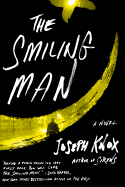
| Publisher: | Crown | |
| Genre: | Crime, Thrillers, Fiction, Noir | |
| ISBN: | 9781524763190 | |
| Pub Date: | January 2019 | |
| Price: | $26 |
| Mystery & Thriller |
by Joseph Knox
After the disastrous events in Joseph Knox's debut, Sirens, Detective Constable Aiden Waits is banished to the night shift with the partner no one wants, DI Peter "Sutty" Sutcliffe. Permanent night duty is the mark of no life or no career, and Waits has managed to blow up both. Then he comes across the Smiling Man.
An historic hotel, the Palace is closed for "renovations" (i.e., the acrimonious divorce of its owners) when an alarm is triggered. Waits and Sutty arrive to find the night watchman face down in a hallway. Behind the wide-open door of room 413, Waits spies a body in a chair, the muscles of its dead mouth "contracted viciously, and locked into a wide, wincing grin."
The detectives spin down the rabbit hole of the unidentified man, and characters swarm around at a furious pace. The plot thickens through flashbacks to a young boy abused as a crime tool by a Fagin-esque father figure. Knox never lets up, taking left turns just when the clues seems to jibe. Despite the chaos, he's always in firm control of each ball in the air, as if the precarious nature of their flight is merely an illusion.
The setting of gritty London is wonderfully on display (sounds emanate from a heat wave like the "slow-drip of people losing their minds"). Knox's vivid descriptions ("He was a wiry, fatalistic spider of a man who played chess with the people around him") make The Smiling Man a noirish pleasure. --Lauren O'Brien of Malcolm Avenue Review
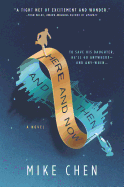
| Publisher: | Mira | |
| Genre: | Family Life, General, Literary, Time Travel, Fiction, Action & Adventure, Science Fiction | |
| ISBN: | 9780778369042 | |
| Pub Date: | January 2019 | |
| Price: | $26.99 |
| Starred | Science Fiction & Fantasy |
by Mike Chen
Journalist Mike Chen's first novel, Here and Now and Then, is a thoughtful and twisty time-travel adventure combined with family drama.
Kin Stewart is a cop in the future world of 2142, going to various times and places to chase down criminals attempting to disrupt history. On his latest trip, to 1996 San Francisco, the beacon that would facilitate his return is destroyed, and he is trapped in the past. After laying low for a year, Kin accepts that no one is coming to get him, and he settles into life in the late 20th century. His memories of his future-world life fade as he takes a job in IT, falls in love and marries Heather and they eventually have a daughter named Miranda.
This happy life is shattered, though, when someone finally shows up to rescue him--18 years too late. Reluctantly, he disappears from his life and returns to 2142, where he's been gone only two weeks and his fiancé is waiting. Kin struggles to adjust to his life there while desiring to stay connected to Heather and Miranda. When he discovers that his daughter's life is in peril in the past, he must find a way to save her, no matter what the cost.
This gripping, fast-paced time-travel thriller is also a warm, moving story of a man pulled between two lives and families. With plenty of humor (for instance, Kin's daughter is a Dr. Who fan) and suspense, Chen has crafted an original and captivating story. --Suzan L. Jackson, freelance writer and author of Book By Book blog

| Publisher: | Sourcebooks Casablanca | |
| Genre: | Romance, Contemporary, Fiction | |
| ISBN: | 9781492655930 | |
| Pub Date: | January 2019 | |
| Price: | $7.99 |
| Romance |
by Samantha Chase
Sophia Bennington loved her small town in Kansas--until she learned that her whole life was predicated on a lie. Fleeing her roots, she arrives in southern California, determined to find a new job and take up surfing.
Christian Montgomery is burned out, although he won't admit it. As a member of the family-owned investment firm, Christian works insane hours to try to appease his implacable father. His only source of stress relief is sitting on the deck of his beachside house, watching the surfers. When chance brings Sophia and Christian together, they quickly discover that each has something the other needs. Christian offers her stability as she navigates her new life, and Sophia lightens him up and convinces him not to work so hard. But when tragedy strikes the Montgomery family, will their burgeoning relationship be able to withstand the pressure?
Samantha Chase (Until There Was Us, Tangled Up in You) aptly captures the stresses and worries of a new relationship and all the pitfalls that lie along the path to romantic happiness. Suddenly Mine is Chase's ninth novel about a Montgomery relationship, but can easily be read as a standalone, since a few Montgomery cousins are merely peripheral characters. Sweet, but not saccharine, and well-paced, this romance is light and agreeable. The southern California climate is the perfect breezy backdrop for Christian and Sophia's story. --Jessica Howard, bookseller at Bookmans, Tucson, Ariz.

| Publisher: | Mariner | |
| Genre: | Inspirational & Religious, Women Authors, Middle Eastern, American, Love & Erotica, Psychology, General, Poetry, Ethnopsychology, Mental Health, Subjects & Themes, LGBT | |
| ISBN: | 9781328511942 | |
| Pub Date: | January 2019 | |
| Price: | $15.99 |
| Poetry |
by Hala Alyan
Hala Alyan writes poems as if she were on fire, and The Twenty-Ninth Year is exemplary. The title of the collection refers to the poet's age. Nearing 30, she offers one incendiary take after another on a broken world, through which she navigates with a keen, if weary, eye. The Palestinian American poet jumps from life in the Middle East--Syria, Iraq, Beirut--to the United States, exploring immigration, displacement, substance abuse and alienation, always with a will to face reality no matter the cost.
The poet's style varies. She often writes in blocks of prose poetry. She also uses fragments and run-ons to razor-sharp effect. Her poems have the texture of shrapnel. Nowhere is this truer than in "Cliffhanger," in which the poet's thoughts spill across the page as though driven by combustible force: "how I still defend him how a wound/ like that/ over a decade/ becomes a kind of heart." In "Aleppo," the grim realities of civil war are juxtaposed with the poet's "ugly human impulse to make it mine." Bringing that trauma back to the states, she writes, "We could paper all of Arkansas with your missing." But the collection is not without a scrappy hope, that human impulse that also moves toward wholeness. "I want to love something without having to apologize for it," she says in "I'm Not Speaking First." "Please don't tell."
Full of painful truths, The Twenty-Ninth Year is riveting verse. --Scott Neuffer, writer, poet, editor of trampset
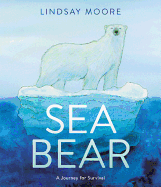
| Publisher: | Greenwillow Books | |
| Genre: | Animals, Environmental Conservation & Protection, Science & Nature, Marine Life, Juvenile Nonfiction, Bears | |
| ISBN: | 9780062791283 | |
| Pub Date: | January 2019 | |
| Price: | $17.99 |
| Starred | Children's & Young Adult |
by Lindsay Moore
Lindsay Moore, who has an MS in medical and scientific illustration, blends her backgrounds with stunning success in her debut picture book, the quietly powerful Sea Bear: A Journey for Survival.
Sea Bear takes its readers on an informative journey with a polar bear narrator leading the way. The poetic rhythm of the text marches along with the Arctic odyssey, telling young readers that "a polar bear can outwait almost anything--/ seals,/ storms,/ and long, sunless winters." But "a bear at sea needs something to stand on." Thus begins Moore's subtle discussion of the realities of climate change and its effects on the magnificent bear. "There is not enough ice left to hunt on," her narrative continues. "Each day there is less ice to stand on."
Moore's experience with marine biology infuses her content as well as the realism of the imagery. As the polar bear swims with aquatic creatures like the star-skinned narwhals, walruses and whales, readers experience a faithful and exciting visual tour of the ocean. The rich colors and textures of the Arctic environment are so lifelike, they might even elicit shivering. Moore's illustrations also work to emphasize both the enormity of the region and the environmental crisis through striking images that often dwarf the massive polar bear.
Moore's picture book is more than a lesson--her passion, creativity and skill make Sea Bear an emotional work likely to ensure that the effects of climate change resonate with the reader. "Polar bears are not land bears," her text states. "We wait on land./ We hope on land." Etched atop an illustration of the bear with her cubs, Moore finishes with a delicate plea for action: "We know how to hope and how to wait." --Jen Forbus, freelancer
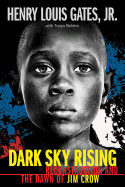
| Publisher: | Scholastic | |
| Genre: | People & Places, United States - Civil War Period, United States - African-American, United States/20th Century, History, Juvenile Nonfiction | |
| ISBN: | 9781338262049 | |
| Pub Date: | January 2019 | |
| Price: | $19.99 |
| Children's & Young Adult |
by Henry Louis Gates Jr., Tonya Bolden
In his first book for young readers, award-winning author, critic and scholar Henry Louis Gates, Jr. addresses "one of the most turbulent and intriguing times in the shaping of America." As Gates writes in his introduction, when he was growing up, his teachers did not "dig deeply into the reasons for slavery, or why racial segregation happened." In Dark Sky Rising, Gates helps children make sense of one of the least understood chapters in American history: the period of rebuilding the South following the Civil War.
Dark Sky Rising is packed with illustrations and engrossing facts about the people and places affected by Reconstruction. Gates--with prolific children's author Tonya Bolden--portrays the dizzying process the U.S. government and its citizens went through to reunite the South with the North and to "heal the sectional divide that slavery and secession had caused."
Beginning with President Abraham Lincoln's Emancipation Proclamation on January 1, 1863, Gates works his way chronologically through the Compromise of 1877, which effectively ended Reconstruction, and beyond, to the "bleak and midnight days" when Jim Crow was the rule of the land. Hope is a constant theme, as African Americans persevered, "press[ing] on with their ambitions to attend college, get an education, own a home, or start a business," and "pushing back against the negative stereotypes of black people so pervasive during the Jim Crow era."
For young scholars of American history--those not daunted by large swaths of sometimes devastating facts--Dark Sky Rising is a treasure trove of knowledge. Readers who wonder about yesterday and care about tomorrow will be fascinated and moved by the story of African American people during the 1860s, 1870s and beyond. --Emilie Coulter, freelance writer and editor

| Publisher: | Wednesday Books/Macmillan | |
| Genre: | Paranormal, Occult & Supernatural, Epic, Fantasy, Young Adult Fiction, Historical | |
| ISBN: | 9781250144546 | |
| Pub Date: | January 2019 | |
| Price: | $18.99 |
| Children's & Young Adult |
by Roshani Chokshi
It is believed that God scattered pieces of the destroyed Tower of Babel across the world. In 1889, a number of aristocratic Houses (together known as the Order of Babel) are sworn to safeguard the locations of their Babel Fragments, the sources of "Forging" power: the "power of creation" that allows people with innate magical ability to reform and remake mind and matter. The French section of the Order of Babel once had four houses that protected their Fragment. Then, "one House fell. And another House's line died without an heir. Now all that is left is a secret."
Such is the world of Roshani Chokshi's (The Star-Touched Queen) The Gilded Wolves. Half-French, half-Algerian Séverin should be the Patriarch of the third house, House Vanth, but it is an open secret that Séverin was denied his inheritance due to his race. Now, Séverin and a band of other teens on the fringes of society work together to pull off Mission Impossible-level stunts to regain pieces of his inheritance--and hopefully, someday, the House itself. On this team are Tristan, with the ability to Forge fantastic landscape art; Laila, a cabaret star from India with the ability to read objects' histories; Enrique, a half-Filipino, half-Spanish historian without the ability to Forge; and Zofia, a Polish-Jewish Forging engineer. The Gilded Wolves goes on to set up a fantastical great heist with a series of clues and problems the group of teens must decipher.
Chokshi's third-person narrative slips easily between the teens' perspectives, granting the reader inside views of their loving, tangled lives. Her world is lush and her characters distinct and engaging--this first in a new series is as sharp and lustrous as the title suggests. --Siân Gaetano, children's and YA editor, Shelf Awareness